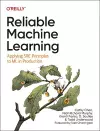
Reliable Machine Learning
5 authors - Paperback
£63.99
Born to code, David Smiley is a software engineer who's passionate about search, Lucene, spatial, and open source. He has a great deal of expertise with Lucene and Solr, which started in 2008 at MITRE. In 2009, as the lead author, along with the coauthor Eric Pugh, he wrote Solr 1.4 Enterprise Search Server, the first book on Solr, published by Packt Publishing. It was updated in 2011, Apache Solr 3 Enterprise Search Server, Packt Publishing, and again for this third edition. After the first book, he developed 1- and 2-day Solr training courses, delivered half a dozen times within MITRE, and he has also delivered training on LucidWorks once. Most of his excitement and energy relating to Lucene is centered on Lucene's spatial module to include Spatial4j, which he is largely responsible for. He has presented his progress on this at Lucene Revolution and other conferences several times. He currently holds the status of committer & Project Management Committee (PMC) member with the Lucene/Solr open source project. Over the years, David has staked his career on search, working exclusively on such projects, formerly for MITRE and now as an independent consultant for various clients. You can reach him at [email protected] and view his LinkedIn profile here: http://www.linkedin.com/in/davidwsmiley. Fascinated by the 'craft' of software development, Eric Pugh has been involved in the open source world as a developer, committer, and user for the past decade. He is an emeritus member of the Apache Software Foundation. In biotech, financial services, and defense IT, he has helped European and American companies develop coherent strategies to embrace open source software. As a speaker, he has advocated the advantages of Agile practices in search, discovery, and analytics projects. Eric became involved in Solr when he submitted the patch SOLR-284 to parse rich document types, such as PDF and MS Office formats, that became the single-most popular patch, as measured by votes! The patch was subsequently cleaned up and enhanced by three other individuals, demonstrating the power of the free / open source models to build great code collaboratively. SOLR-284 was eventually refactored into Solr Cell. He blogs at http://www.opensourceconnections.com/blog/. Kranti Parisa has more than a decade of software development expertise and a deep understanding of open source, enterprise software, and the execution required to build successful products. He has fallen in love with enterprise search technologies, especially Lucene and Solr, after his initial implementations and customizations carried out in early 2008 to build a legal search engine for bankruptcy court documents, docket entries, and cases. He is an active contributor to the Apache Solr community. One of his recent contributions, along with Joel Bernstein, SOLR-4787, includes scalable and nested join implementations. Kranti is currently working at Apple. Prior to that, he worked as a lead engineer and search architect at Comcast Labs, building and supporting a highly scalable search and discovery engine for the X1/X2 platform-the world's first entertainment operating system. An entrepreneur by DNA, he is the cofounder and technical advisor of multiple start-ups focusing on cloud computing, SaaS, big data, and enterprise search based products and services. He holds a master's degree in computer integrated manufacturing from the National Institute of Technology, Warangal, India. You can reach him on LinkedIn: http://www.linkedin.com/in/krantiparisa.